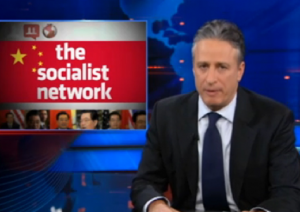Social Media World Report: The China/LinkedIn Blockade
 By Eve Mayer Orsburn | @LinkedInQueen
By Eve Mayer Orsburn | @LinkedInQueen
In the good old US of A, we know a news story is culturally relevant when it appears in a round of jokes on The Daily Show with Jon Stewart or on The Colbert Report with Stephen Colbert. Take that BBC...
Jabs and puns about the 'Great Fire Wall of China' and 'The Socialist Network' aside, China recently stirred international tension and concern when the country's government blocked the social networking site used by over 90 million individuals as a professional resource worldwide.
Though it seems that the Chinese government came to its senses, the situation brings up some interesting points...
Who had a hankering to cause some major upheaval toward China’s current government control? Reports on the controversy surrounding China’s LinkedIn ban stemmed from tracing down a username identified as ‘Jasmine Z’ who was generating conversation about recent revolutions in Tunisia, Egypt, and Libya within a discussion group called ‘Jasmine Voice’ on the LinkedIn platform. From there the user had been encouraging participants to share their views on the potential for a similar revolution in China?
In posting several comments within the discussion group, Jasmine Z expounded upon the ideas behind Democracy, Freedom, and Justice, stating pointedly “After years of independent thinking, I am becoming a critical dissent dying for democracy, freedom and justice in my homeland,”
A second and third post went on to say that “China’s Communist Party members fail to “realize the crisis of the autocratic one-party system” and then referred to the party as “a power and elite club.” That’s the thing about the internet: people are going to say whatever they feel is important, wherever they can find a place to do so. The Chinese government can block every internet site except its own, but dissent will still find a voice.
Are political protests on social networks becoming more influencing than the #bieberfever hashtag? Given the current state of social revolutions that seem to be springing up like mushrooms after a hard spring rain, one begins to wonder… Does organizing a political movement via social networks like Twitter, Facebook, YouTube, Blogs, and LinkedIn stand a chance at stripping away totalitarian power implemented for years by dictators in many countries? If trends continue, the answer to that question may be yes.
In a recent interview with Time Magazine, Nicholas Bequelin, Hong Kong-based researcher for Human Rights Watched, explained further how “Information is growing faster than censorship. I don’t believe that the Internet itself will bring democracy to China, but it changes people’s attitudes and the association between themselves and the rest of the world. It’s an important shift in people’s minds. The ease with which dissent spreads online means that while China isn’t likely to see its own Jasmine Revolution, the authorities won’t be resting easily either.”
Social media allows people with similar opinions to join together, share their views, and influence others. Although certain oppressive governments might try to ban searches with keywords affiliated with political protests in an attempt to regain control of the populous, it’s a hard reality that censored information channels and even government Internet blockades can be penetrated and sidestepped.
How will this impact the LinkedIn Corporation? Having previously avoided China’s infamous censoring efforts, LinkedIn was deemed a permissible social network as it is primarily seen as a job-hunting tool for both employees and employers. However, since its initial release, LinkedIn has integrated more features such as the ability to sync the user’s Twitter stream to their LinkedIn profile.
When released in 2006 Twitter immediately got bumped to the ‘Restrict Access’ list in China, so this ban will further affect users who cross-integrate their social platforms into one domain. Furthermore, a report released by LinkedIn later in the week shared further insight to the blockage of the service, which “appears to be part of a broader effort in China going on right now, involving other sites as well. We will continue to monitor the situation.”
LinkedIn’s plan to kick off 2011 with an Initial Public Offering set at up to $175 million will also be a factor to monitor. It is unclear as to what, if any, effect China’s fluctuating policy in regards to LinkedIn will have on that effort.
